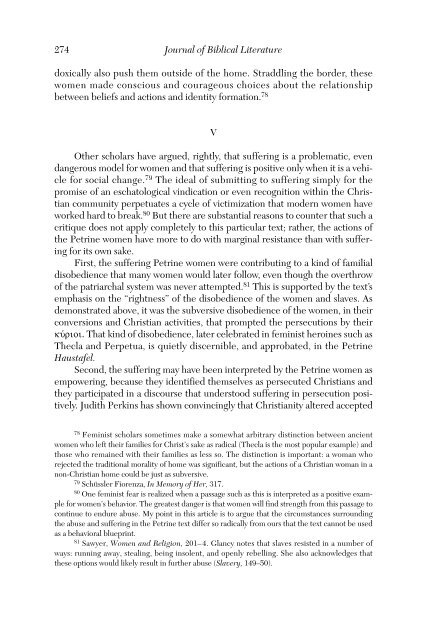Journal of Biblical Literature - Society of Biblical Literature
Journal of Biblical Literature - Society of Biblical Literature
Journal of Biblical Literature - Society of Biblical Literature
You also want an ePaper? Increase the reach of your titles
YUMPU automatically turns print PDFs into web optimized ePapers that Google loves.
274<br />
<strong>Journal</strong> <strong>of</strong> <strong>Biblical</strong> <strong>Literature</strong><br />
doxically also push them outside <strong>of</strong> the home. Straddling the border, these<br />
women made conscious and courageous choices about the relationship<br />
between beliefs and actions and identity formation. 78<br />
V<br />
Other scholars have argued, rightly, that suffering is a problematic, even<br />
dangerous model for women and that suffering is positive only when it is a vehicle<br />
for social change. 79 The ideal <strong>of</strong> submitting to suffering simply for the<br />
promise <strong>of</strong> an eschatological vindication or even recognition within the Christian<br />
community perpetuates a cycle <strong>of</strong> victimization that modern women have<br />
worked hard to break. 80 But there are substantial reasons to counter that such a<br />
critique does not apply completely to this particular text; rather, the actions <strong>of</strong><br />
the Petrine women have more to do with marginal resistance than with suffering<br />
for its own sake.<br />
First, the suffering Petrine women were contributing to a kind <strong>of</strong> familial<br />
disobedience that many women would later follow, even though the overthrow<br />
<strong>of</strong> the patriarchal system was never attempted. 81 This is supported by the text’s<br />
emphasis on the “rightness” <strong>of</strong> the disobedience <strong>of</strong> the women and slaves. As<br />
demonstrated above, it was the subversive disobedience <strong>of</strong> the women, in their<br />
conversions and Christian activities, that prompted the persecutions by their<br />
kuvrioi. That kind <strong>of</strong> disobedience, later celebrated in feminist heroines such as<br />
Thecla and Perpetua, is quietly discernible, and approbated, in the Petrine<br />
Haustafel.<br />
Second, the suffering may have been interpreted by the Petrine women as<br />
empowering, because they identified themselves as persecuted Christians and<br />
they participated in a discourse that understood suffering in persecution positively.<br />
Judith Perkins has shown convincingly that Christianity altered accepted<br />
78 Feminist scholars sometimes make a somewhat arbitrary distinction between ancient<br />
women who left their families for Christ’s sake as radical (Thecla is the most popular example) and<br />
those who remained with their families as less so. The distinction is important: a woman who<br />
rejected the traditional morality <strong>of</strong> home was significant, but the actions <strong>of</strong> a Christian woman in a<br />
non-Christian home could be just as subversive.<br />
79 Schüssler Fiorenza, In Memory <strong>of</strong> Her, 317.<br />
80 One feminist fear is realized when a passage such as this is interpreted as a positive example<br />
for women’s behavior. The greatest danger is that women will find strength from this passage to<br />
continue to endure abuse. My point in this article is to argue that the circumstances surrounding<br />
the abuse and suffering in the Petrine text differ so radically from ours that the text cannot be used<br />
as a behavioral blueprint.<br />
81 Sawyer, Women and Religion, 201–4. Glancy notes that slaves resisted in a number <strong>of</strong><br />
ways: running away, stealing, being insolent, and openly rebelling. She also acknowledges that<br />
these options would likely result in further abuse (Slavery, 149–50).

















